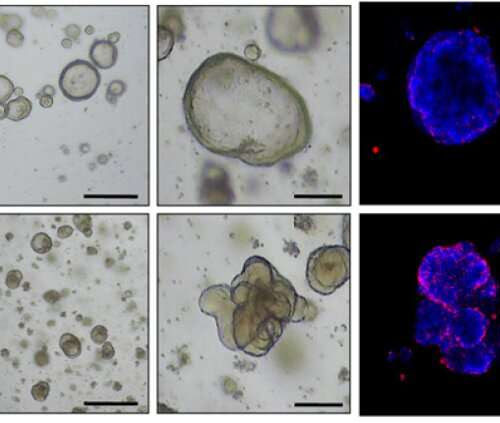A mechanism that enables cancer cells to scavenge dead cell debris for nourishment may lead to new ways to overcome drug resistance, a new study shows. Drug resistance remains a major challenge in the fight against cancer. “Cancer cells require a tremendous amount of nutrients,” says Aimee Edinger, professor of developmental and cell biology at...
Tag: <span>Cancer Cell</span>
Cancer cell reversion may offer a new approach to colorectal cancer treatment
by The Korea Advanced Institute of Science and Technology (KAIST) A novel approach to reverse the progression of healthy cells to malignant ones may offer a more effective way to eradicate colorectal cancer cells with far fewer side effects, according to a team of researchers based in South Korea. Colorectal cancer, or cancer of the...
New treatment triggers self-destruction of pancreatic cancer cells
Research conducted on human pancreatic tumors transplanted in mice reveals promising results, Tel Aviv University researchers say AMERICAN FRIENDS OF TEL AVIV UNIVERSITY Pancreatic cancer is resistant to all current treatments. Patients have extremely poor chances of surviving for five years after being diagnosed. A new Tel Aviv University study finds that a small molecule...
First melanoma test identifies those at low risk of cancer spreading
by Newcastle University ITV Tyne Tees presenter, Pam Royle, is one of the first to try a new test developed by Newcastle University which predicts whether her skin cancer is likely to return. The test which reliably predicts that a melanoma is unlikely to spread or return has been developed by scientists at Newcastle University....
In rare case, patient developed resistance to CAR-T after cancer cell began hiding in ‘plain sight’
To make CAR-T therapies, the pioneering cancer treatments, scientists introduce a gene into the body’s immune cells that turns them into cancer-homing attackers. But in one case described by scientists Monday, the gene was inadvertently delivered to a cancer cell instead, camouflaging it from the therapy and allowing cancer to develop resistance to treatment. Image:...
Compound discovered that targets cancer cells lacking the protective p53 ‘guardian gene’
Developed and tested at the University of Huddersfield, the compound, containing ruthenium, is attracted to the vulnerable cancer cells, whilst leaving healthy cells untouched UNIVERSITY OF HUDDERSFIELD A NEW chemical compound with the potential to destroy hard-to-treat cancer cells has been developed and tested by scientists at the University of Huddersfield. Also, the compound causes...
Electric fields: cancer killers?
Pulsing cells with electric fields can force calcium diffusion into cells. Researchers have now optimized this technique in an attempt to kill cancer cells and leave healthy cells intact. Researchers from the Bioelectrics Department of Kumamoto University (Japan) have identified the optimal pulsed electric field (PEF) conditions for the maximum calcium cell membrane permeability. There...
New anti-cancer drugs put cancers to sleep—permanently
In a world first, Melbourne scientists have discovered a new type of anti-cancer drug that can put cancer cells into a permanent sleep, without the harmful side-effects caused by conventional cancer therapies. Killer T cells surround a cancer cell. Credit: NIH Published today in the journal Nature, the research reveals the first class of anti-cancer drugs that work by putting...
Scientists Discovered a “Kill Switch” That Destroys Any Cancer Cell
IN BRIEF A new study has pinpointed a natural mechanism that cells used to defend against cancer millions of years ago. It could provide a new means of advanced cancer treatment. SUICIDE MOLECULES A new study has established that RNA molecules, originally developed as a means of studying genes, can trigger a hidden mechanism that...
- 1
- 2

